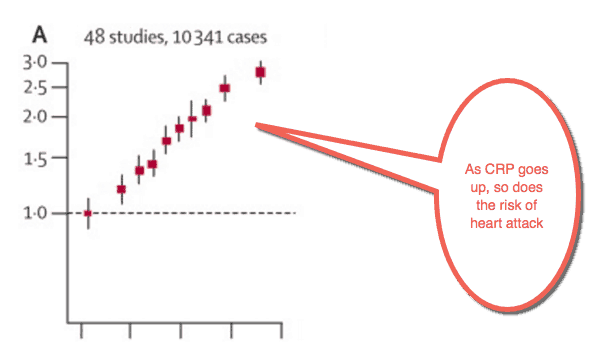
Nobody really knows whether or not a person will have a heart attack. But one simple test is most predictive of all that you will get a heart attack at some point.
But one simple test is the most predictive of all that you will have a heart attack at some point.
In this newsletter, I want to give you the evidence for getting this one test.
And I want to show you a way that may actually lower your risk of heart attack permanently.
Of all indicators, C-reactive protein may be the best predictor of a heart attack.

In this paper, they reviewed evidence for C-reactive protein or CRP predicting a heart attack.
C-reactive protein is formed whenever you have inflammation going on inside your body.
Even if you have pneumonia, your CRP will be elevated.
Any disease or infection that your body fights off results in higher CRP.
In a test of CRP, or a newer test called HS, or high-sensitivity, CRP, what you want is a result of as close to zero as possible.
A CRP or HS CRP result of zero shows you have no inflammation going on inside your body.
And that’s what you want.
Now as it turns out in a given person, as the study says,
CRP concentration is as consistent within individuals during several years as are total cholesterol concentration and systolic blood pressure.
CRP is therefore very stable and can be measured and used in diagnosing the possibility that you have inflammation going on inside of you and that therefore you may have a heart attack soon.
So now that we can predict the likelihood of getting a heart attack, how can we prevent a heart attack?
Let’s look at the possibility that lowering CRP will actually cut the risk of heart attack.
This isn’t necessarily true.
For example, let’s say that your house is on fire, and there are firemen around the fire.
If you take the firemen away, your house is still on fire.
It is possible that CRP acts like the firemen.
CRP is present to fight inflammation, but if you lower it, it’s like taking firemen away from the fire.
There are ways we can lower CRP, as this paper shows:

Aspirin lowers CRP, and aspirin is known to lower the chances of getting a heart attack.
But perhaps one of the best methods of lowering CRP of all is vitamin E.
In this study they actually gave healthy young men and women by many and measured their CRP levels over a couple of months:
The level of hsCRP decreased during vitamin E treatment (1.07 +/- 0.9 mg/l vs. 0.2 +/- 0.14 mg/l, and remained suppressed after the cessation of treatment
Translated, that means that the average CRP was about 1.07 and that it fell to barely noticeable levels with vitamin E.
And the vitamin E treatment continued keeping CRP levels down after consumption was stopped.
This means that vitamin E may very well lower CRP levels.
The next question is, is lowering CRP levels the same as putting out the fire?
Does it help lower the chances of a heart attack if you lower CRP using something like vitamin E or aspirin? The jury is still out on that,
The jury is still out on that, however, I’m betting on vitamin E.
And if you do take vitamin E, you might want to first speak to your doctor– especially if you’re taking any other medications.
Vitamin D is very powerful in thinning the blood.
Also, you may want to take a mixed gamma to cover for all types of vitamin D rather than the alpha-tocopherol type.
The mixed gamma tocopherols vitamin E has been shown to be more effective in some studies.
————————-

- C-reactive protein concentration and risk of coronary heart disease, stroke, and mortality: an individual participant meta-analysis
http://www.sciencedirect.com/science/article/pii/S0140673609617177 - C-Reactive Protein (CRP)-Lowering Agents
http://onlinelibrary.wiley.com/store/10.1111/j.1527-3466.2006.00033.x/asset/j.1527-3466.2006.00033.x.pdf
- C-Reactive Protein (CRP) Test: MedlinePlus Lab Test Information
https://medlineplus.gov/lab-tests/c-reactive-protein-crp-test/ - C-Reactive Protein (CRP) - Lab Tests Online
https://www.mc.vanderbilt.edu/~patient/stats.pl?usr:unknown+styID:63+resID:582+dm:

